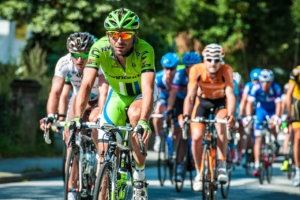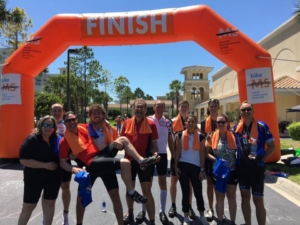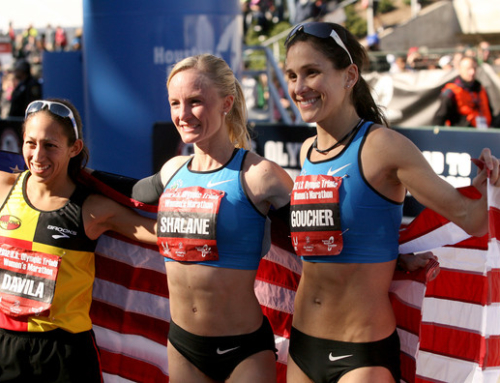By Eddie Pipkin
May 10, 2017
This past weekend I went on a long biker ride with some good friends. It’s a ride we do every year to help raise money for multiple sclerosis research. This year’s distance was 78 miles, lots of time for fun and for long stretches of thinking. And along the way, I had an epiphany about the ministry lessons that could be learned from bike riding.
We do this and other rides as a group (10 of us on this occasion, middle-aged guys and gals with some younger folks mixed in) in various stages of fitness, all working together to enjoy the exercise, social interaction, and scenery. I’ve been riding with these folks for 10 years now, and there are some great parallels between road biking and working with folks in ministry. Here’s some of what I’ve learned in countless hours on the bike:
- Everything is easier (and more fun) with a team. If you’ve ever had the opportunity to watch some of the Tour de France or any other professional bike race, you are familiar with the concept of the peloton. That’s the long line of riders that group together and draft off one another to spread the effort more efficiently. Riders take turns at the front of the pack doing the hard “lead” work. For those farther back in line, the reduction in effort required can be an astounding 40%. What this means is everybody in the group can go farther and faster than they would ever be able to do as individuals. Ministries can benefit from the peloton concept, strategically spreading out the work of leadership to give everyone a season of hard effort and a season of being pulled along, resulting in more efficiency and less burnout for everyone involved.
- Preparation pays off. Some of our weekend riders were better prepared than others, and it showed. It was a particularly windy day, and there was a clear performance difference for those who had more practice rides, especially those who had practiced in windy conditions (as opposed to inside trainer work). As ministry leaders, we should always be taking advantage of training opportunities (workshops, online seminars, mentoring), and we should always be encouraging our “leaders in waiting” to have specific tasks that they are learning while safely supervised. It’s also great to visualize and practice options for what to do when things go wrong. We had three flats among team members on our ride, but we were ready to change them with no drama. Ministry is never going to be perfect. There will always be opportunities to problem solve on the fly.
- Good equipment matters. All my riding partners have pretty nice road bikes, but even the best built, most expensive bike can be useless on a long ride if it has not been properly maintained. Brakes fail, chains break, derailleurs refuse to shift smoothly. Any of these snafus can ruin a good ride. (We had a young guy who chose to wear a worn out old pair of bike shoes that promptly disintegrated on him—hysterical for us, but a real challenge for him). Most ministry involves peripheral equipment related to the event at hand: from buses to sound and projection equipment to sports equipment, it’s important to keep it all in good working order. Don’t let laziness on the maintenance and inspection front ruin the execution of a great idea.
- It’s essential to trust your teammates. The peloton is a place where you are tire to tire, elbow to elbow, with other riders on whom you are depending on to communicate clearly and keep the group safe (to get a sense of this, watch this gut-clenching video of the end of a Tour de California race stage). One wild veer of the bike or sudden unannounced stop can lead to a calamity, particularly at high speeds. Road cyclists have an elaborate series of hand gestures and shouted updates to keep everyone on the same page. They think of the group’s welfare with every move. This kind of focus is also vital in ministry (the more complex or high drama, the more essential the need for strong communication and a commitment to the group).
- Pay attention to the signs. A well-supported bike ride has clear maps for a long route, and riders can familiarize themselves with these maps well in advance. On the day of the ride, there are clear markings on the road along the route, noting each turn, and reaffirming for riders that they are always going the correct direction. Similarly,
 well-run ministry should be clear with all supporters and participants as to exactly what the vision is for that ministry. There should be an easy-to-navigate road map for all servant leaders, with waypoints to regularly reassure them they are on the right path, as well as regular check-ins with guidance to get them back on course if they have strayed.
well-run ministry should be clear with all supporters and participants as to exactly what the vision is for that ministry. There should be an easy-to-navigate road map for all servant leaders, with waypoints to regularly reassure them they are on the right path, as well as regular check-ins with guidance to get them back on course if they have strayed. - Take advantage of rest stops. A well-supported bike ride also has glorious rest stops, evenly spaced along the route, staffed by smiling volunteers who have loaded tables with bananas, oranges, peanut butter and honey sandwiches, Fig Newtons, and coolers of Powerade. It is a wonderful feeling to be refreshed, rested, and cheered on after miles of hard riding. You pedal back onto the course reinvigorated and ready for more. How wonderful, how biblical, when we do the same for our ministry partners, encouraging them to recharge, keeping them grounded in the refreshment of God’s Word, giving them an occasional chance to catch their breath, and being their dedicated cheerleaders.
There is a real sense of accomplishment after a very long bike ride with a unified team. The finish line is oh-so-sweet. Completing a ministry goal can be even sweeter, with eternal implications. What are some teamwork lessons you have learned along the way? Share your experiences with us, ask questions, and learn more about ministry team building skills from the folks at Excellence in Ministry Coaching. May the road rise to meet you!







Leave A Comment